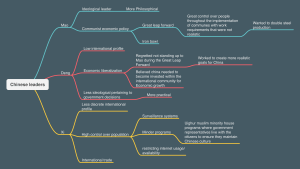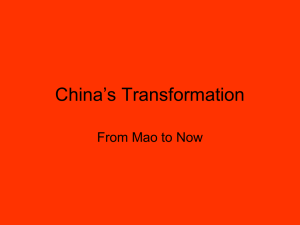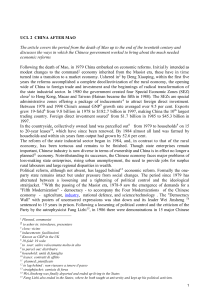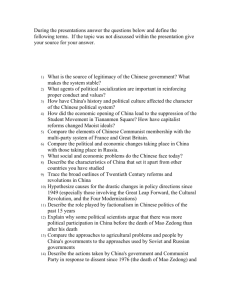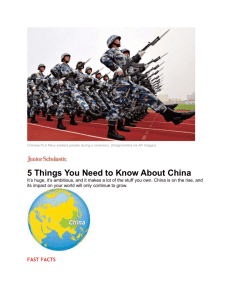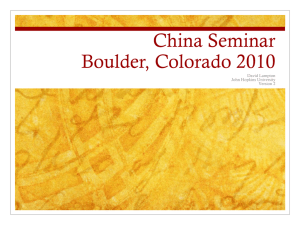File
advertisement
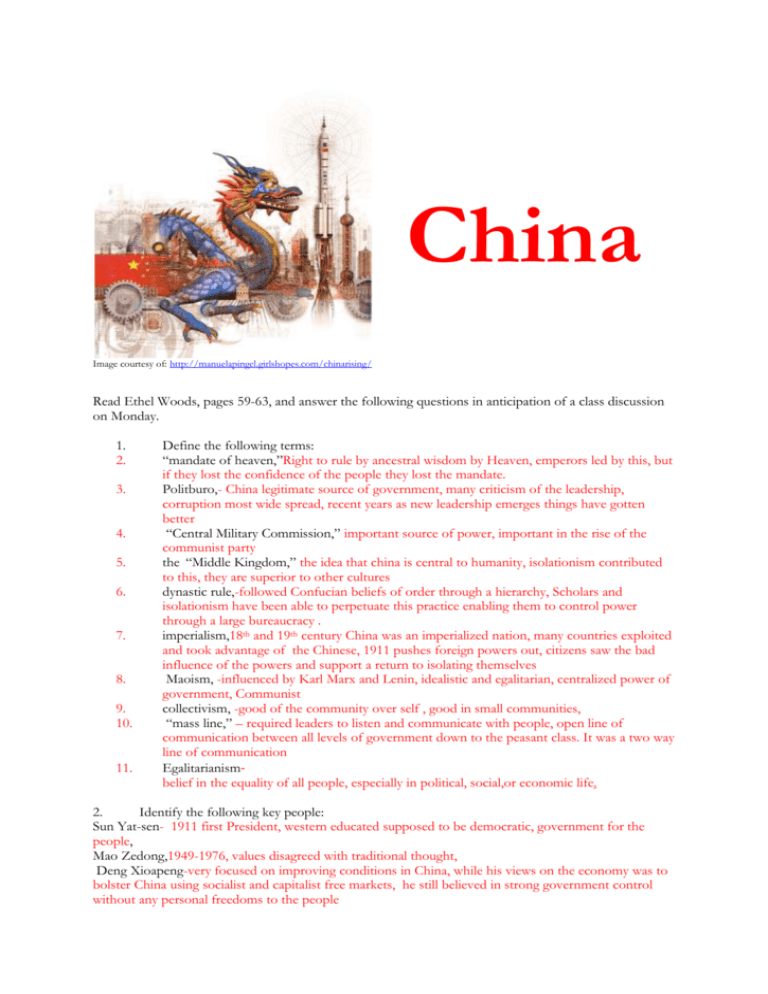
China Image courtesy of: http://manuelapingel.girlshopes.com/chinarising/ Read Ethel Woods, pages 59-63, and answer the following questions in anticipation of a class discussion on Monday. 1. 2. 3. 4. 5. 6. 7. 8. 9. 10. 11. Define the following terms: “mandate of heaven,”Right to rule by ancestral wisdom by Heaven, emperors led by this, but if they lost the confidence of the people they lost the mandate. Politburo,- China legitimate source of government, many criticism of the leadership, corruption most wide spread, recent years as new leadership emerges things have gotten better “Central Military Commission,” important source of power, important in the rise of the communist party the “Middle Kingdom,” the idea that china is central to humanity, isolationism contributed to this, they are superior to other cultures dynastic rule,-followed Confucian beliefs of order through a hierarchy, Scholars and isolationism have been able to perpetuate this practice enabling them to control power through a large bureaucracy . imperialism,18th and 19th century China was an imperialized nation, many countries exploited and took advantage of the Chinese, 1911 pushes foreign powers out, citizens saw the bad influence of the powers and support a return to isolating themselves Maoism, -influenced by Karl Marx and Lenin, idealistic and egalitarian, centralized power of government, Communist collectivism, -good of the community over self , good in small communities, “mass line,” – required leaders to listen and communicate with people, open line of communication between all levels of government down to the peasant class. It was a two way line of communication Egalitarianismbelief in the equality of all people, especially in political, social,or economic life. 2. Identify the following key people: Sun Yat-sen- 1911 first President, western educated supposed to be democratic, government for the people, Mao Zedong,1949-1976, values disagreed with traditional thought, Deng Xioapeng-very focused on improving conditions in China, while his views on the economy was to bolster China using socialist and capitalist free markets, he still believed in strong government control without any personal freedoms to the people 3. Determine the source of political legitimacy in the following Chinese regimes; Imperial China 1911 Chinese Republic-Revolution of 1911, 1st president, democracy, warlords fighting for power, ,Mao emerges People’s Republic of China-1949 under Mao, 4. What is the Chinese Central Military Commission and what role does it play in China? the head is a big part of the policy making process, Deng Xiaoping was the head of the commission and had a lot of power 5. Identify the five main legacies of Dynastic China. Which do you experience in China today? Discuss. Confucian values, hierarchy, order, rule of the few for benefit of the many Today there is still the hierarchy element of government and it is still all about respect your leaders as mandated by Confucian beliefs. 6. How does ethnicity represent a cleavage in Chinese society? Explain. 7. How has geography shaped the political development of China? Through natural land barriers enabled China to self govern w/o much outside influence and ignore the outside world, today with its access to sea and ocean it is able to transport more goods, the rivers have created areas of society, a divide between N. and S. w different climates and terrain have shaped the regions differently 8. How does Maoism compare and contrast with Marxist-Leninism? –more suited to the Chinese people and needs, Leninism was more revolutionary and placed the party in front of all, Mao disagreed with this inequality, strength was with the peasant class, a more hierarchal society, people to be more self reliant and not look to government to take care of things 9. What has arguably been Deng Xioapeng’s greatest contribution to Chinese society? the turn around of the economy, opening of trade and business,
